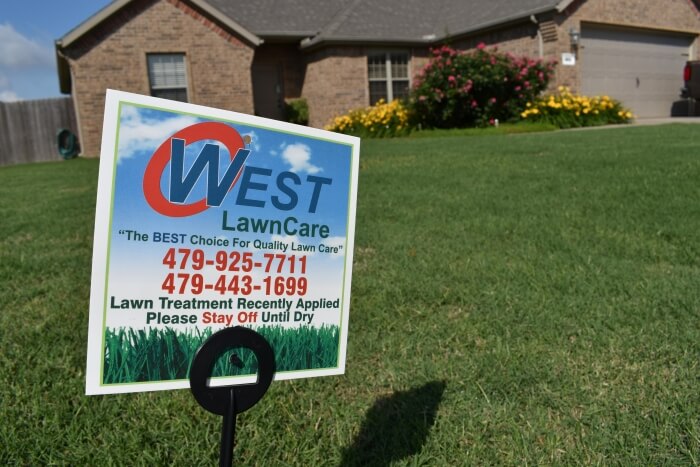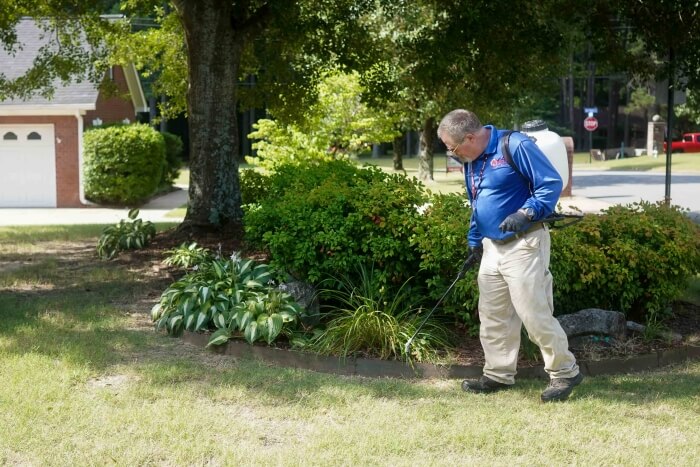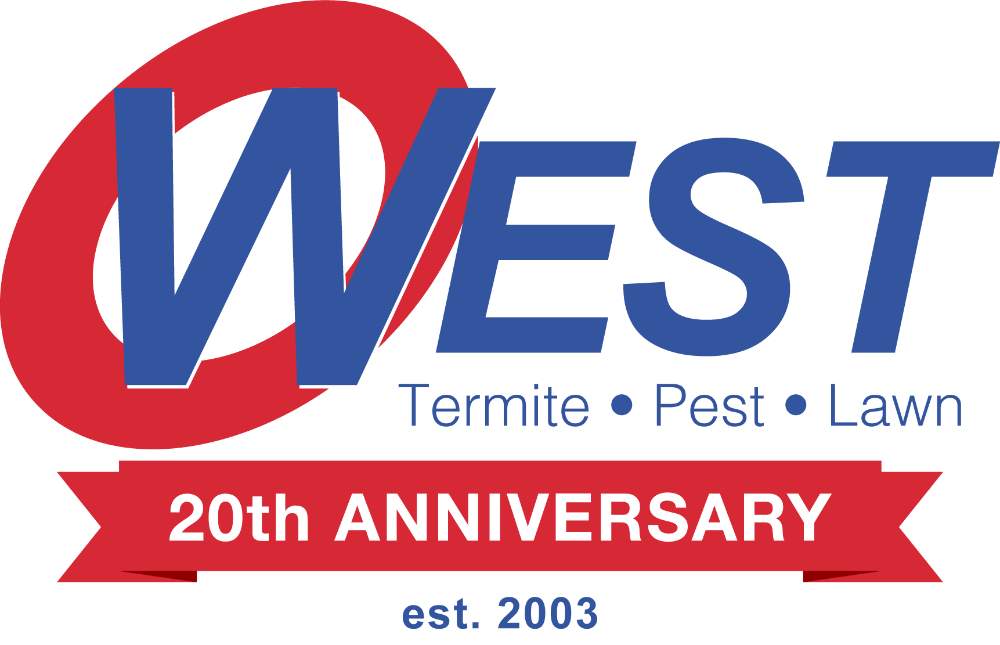
Are you proud of your lawn or is it a constant disappointment?
If dead spots, weeds, and insect-filled plants rule the yard, let our lawn care experts help. West Termite, Pest & Lawn services lawns of all sizes and conditions. Through our years of experience, we have found the best way to grow a lush lawn begins with weed control and fertilization program. A thick, growing lawn is the best weed control, and being on proactive weed control and fertilizer plan is the best way to get a thick and healthy lawn. Weed control treatments are most effective during the dormant season when your lawn and landscape are most susceptible to weeds taking root.
Landscaping and lawns become infested with pests as they seek refuge from the heat during the summer months. If left untreated, by the fall, these critters will build a shelter to survive the winter, and come next spring they will propagate. Without a good treatment plan, your lawn and landscape can become overrun with weeds and unwanted grasses. If left untreated, it can be costly to cultivate a healthy lawn and landscape. West Termite offers pest control, including fleas, ticks, fire ants, gophers, and moles.
Our lawn and landscape programs provide your lawn nutrients and weed control to keep it looking its best. Many of our programs also include free service calls and if any problems crop up between scheduled treatments, we will provide additional services at no cost to you. Plus, West Termite, Pest & Lawn uses treatment methods that are safe for your children and pets. Talk with our lawn treatment experts today to schedule a free inspection.
With over 30 years of experience, we have the know-how to help keep your lawn and landscape looking beautiful. Our technicians have ongoing training to ensure you receive the best service in the business. All of our technicians receive continuous training to ensure the highest quality of work. Techs are also background and drug tested to provide safety and peace of mind for our customers.
The West Termite, Pest & Lawn process
Assessment
As with all of our services, the first step in our lawn care services is to have an in-depth conversation with you and conduct an inspection of your lawn. Based on the size and style of your lawn, your vision for it, and your desired budget, we’ll provide you with several maintenance plan options.
Treatment
Once you choose your services and treatment plan, we’ll develop a convenient-for-you schedule with bi-weekly, monthly, or quarterly visits. We’ll use a combination of specialty tools, techniques, and products to condition and prep your lawn for healthier, lusher growth.
Consistency with a Smile
Once we’ve laid a good foundation for a healthy, lush, pest-free lawn, it’s all about maintenance. As you see your lawn flourish and thrive, we’ll check in about your new goals for it and help you plan out an appropriate servicing timeline to achieve those goals.
What to expect with West’s lawn care service
At West Termite, Pest & Lawn, you can expect consistent, friendly, knowledgeable service with a smile! We are dedicated to helping you create and maintain the lawn of your dreams. Our lawn care specialists are some of the most experienced and knowledgeable in their field. From our turf care technicians to our mosquito control specialists, we’re here to make sure that you and your family can enjoy your outdoor space all year long.
All of our treatments are pet safe and hazard-free. Just allow treated grass to dry for a few hours before enjoying! Once you start using our services, you should notice an immediate difference – usually within the first week! Enjoy a lusher, healthier, greener lawn for playing, relaxing, and entertaining.

Our lawn care services
We offer a variety of lawn care services designed to meet your home’s specific needs and budget. We have a selection of plans for every type of landscaping from tree and shrub programs to weed control.
Weed Control & Fertilization
We offer a variety of programs to fit your weed control and fertilization needs.
Mosquito Control
Don’t let Mosquitos keep you from enjoying the outdoors!
Tree & Shrub
There are hundreds of insects and diseases that can attack your valuable landscaping. Our tree and shrub program protects them from this, plus supplies them with proper fertilization.
Fescue Seeding
Fescue grass normally performs better in partial shade areas. Overseeding in fall is needed to maintain a thick & healthy turf. Fescue can thin out or even die due to heat stress or disease problems.
Lawn Flea & Tick Control
Fleas and Ticks can be a problem to control with pets. Ticks can also cause health problems with several tick-borne diseases such as Lyme disease. This treatment also controls many other insects, such as spiders, chiggers, etc.
Grub Control
White grubs are the larval stage of several beetles found in our areas. They can cause damage to the root system of your lawn. Eliminating grubs can also have an effect on controlling moles since they are a food source.
Core Aeration
Over time poor soil naturally becomes compacted, leaving the subsoil undesirable for healthy lawn growth. This process removes 3/4 inch round & 2-4inch deep plugs in the soil, improving the air, water, and nutrient exchange with the roots.
Lawn care FAQ
Many of our clients have questions about lawn care and lawn upkeep that they can perform between our services to keep their yards looking green and lovely. If you don’t see an answer to your questions about lawn care below, contact West Termite, Pest & Lawn – we’re happy to answer any questions you may have!
How often should I mow my lawn?
The answer to this question depends entirely on the circumstances – the type of grass, the amount of rain you’ve had recently, etc. Instead of a specific time, it’s best to set your lawn mowing schedule against how tall your grass is. You should only cut it once it has reached about four or five inches in height. If you mow your grass too short, it can damage the root systems and cause bald spots, thin your law, decrease drought resistance, and leave room for weeds to creep in.
To avoid cutting your lawn too short, set your mowing height to at least three inches and try to avoid cutting off more than ⅓ of the grass blade. For best results, make sure that your blade is sharp and leave your grass clippings (unless you have clumps) because they fertilize the soil as they decompose.
Should I collect my grass clippings?
How often should I water my lawn?
This depends on the season, but a healthy lawn needs about an inch of rain per week in the summer months. During dry weather or periods or draught, we suggest watering your lawn for an hour every five days. Remember, watering leads to healthy grass and healthy grass is your first line of defense against disease and weeds!
When grass is attempting to conserve water (which means it needs more), you’ll notice the blades folding over on themselves. If you can see your footprints on your lawn after you pass through it, it’s time for watering! The best time of day to water is in the early morning between 6 am and 10 am – if you water in the heat of the day the water can evaporate and burn your grass.
I have dead patches in my lawn – what did I do?
Just remember that in order for seeds to grow and take root they need plenty of water and nutrients! So stick to a strict watering regime while you’re repairing your lawn – until the grass reaches a good four to five inches in height.
How do I get rid of wide-bladed grass in my lawn?
This will kill all the grass and plants in the area, so be very careful about how you treat the quack grass. You’ll need a targeted sprayer to spray the area and about a foot around it in all directions to ensure it has been killed. Make sure it has died (takes about five to ten days) and then tear it up, cover in topsoil, and re-seed.
Can dog waste damage your lawn?
Unfortunately, yes. While feces generally decomposes on its own, large amounts of it can smother grass and cause dead spots on your lawn. The best way to avoid this is to pick up at least once a week.
Canine urine can also cause damage to your lawn. The nitrates present in their urine literally burn the grass and can kill it to the roots. You can attempt to rake thoroughly, water heavily, and re-seed as a defense, and some people recommend sprinkling the area with gypsum to absorb the urine – but this requires you to be present every time your animal goes to the bathroom. The best defense in this case is a good offense. Do everything you can to keep your lawn healthy and it may be able to better resist the damage or your dog’s defecations.
What people are saying about West Termite
We think we’re pretty great, but don’t take our word for it! Take a look at what our satisfied customers have to say about our service!
★★★★★
My neighbors say that my yard is the best on the block
Laleen D.
★★★★★
always prompt and reliable
Kevin B.
★★★★★
Courteous, thorough and on time.
John T.
★★★★★
They do an excellent job
Lori H.
★★★★★
highly recommended by a lot of locals and it’s easy to see why.
Dana A.
★★★★★
Brad W.
